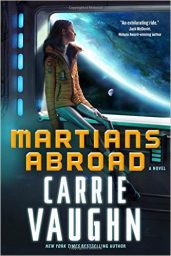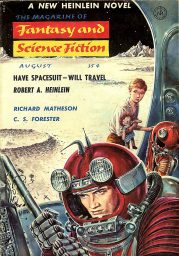THROWBACK SF THURSDAY: Martians Abroad by Carrie Vaughn
Thursday , 2, March 2017 Book Review 12 Comments Two weeks ago I reviewed Have Space Suit—Will Travel, my first Heinlein juvenile. I bought, picked it, and read it a bit ago. The review wound up being very well timed. A YA book imitating the Heinlein juveniles was released on January 17—Martians Abroad by Carrie Vaughn.
Two weeks ago I reviewed Have Space Suit—Will Travel, my first Heinlein juvenile. I bought, picked it, and read it a bit ago. The review wound up being very well timed. A YA book imitating the Heinlein juveniles was released on January 17—Martians Abroad by Carrie Vaughn.
I read a longish blog post a couple weeks ago responding to Martians Abroad by questioning why modern authors, even when they self-consciously try, can’t pull off imitating Heinlein’s juveniles. Three reasons come to mind. One, the market is much different. Publishers pretty much won’t market anything as YA without a romance. And they’ve pretty much abandoned boys to video games. Two, the authors aren’t willing to commit to the straightforward and traditional morals that underlie the tale. Three, they don’t have Heinlein’s talent. There’s the rub for the #pulprevolution. What good is it recognizing the genius of Leigh Brackett or Jack Vance without genius of your own? (Warning: does not apply to Schuyler Hernstrom.)
So how does Martians Abroad compare to a Heinlein juvenile? (Well, really, to Have Space Suit—Will Travel, since that is the only Heinlein juvenile I’ve read.) The answer is…not really at all. Martians Abroad isn’t a bad book. It’s a prototypical book by a pro author off her game—technically proficient but lacking the spark of creative vitality. It is also indistinguishable from any other contemporary YA novel. A Mars colony and a girl named Polly does not a Heinlein juvenile make.
Rather than a straight up review I will focus on comparing it against what I thought made Have Space Suit—Will Travel so special. A quick synopsis of the plot: Polly and her twin brother grew up on Mars, but they are shipped off by their mother to an exclusive boarding school on Earth. In addition to the usual school politics, mysterious accidents begin to befall Polly’s classmates.
Have Space Suit—Will Travel is utterly devoid of any romance. But the conventional wisdom seems to be that you can’t sell YA, i.e., books to girls, unless you include some romance, preferably a love triangle. And girls, unlike everyone else, still buy books. Here, more than anywhere else, Martians Abroad may be caught between its desire to imitate and the modern YA market. Two potential love interests are floated, but nothing much ever comes of it. I’m not sure if I should be thankful of that, or irritated that valuable page space is wasted.
Hard science fiction has been getting a bad rap in these pages here lately. But Have Space Suit—Will Travel is a perfect example of how science can make a set piece work. If Heinlein doesn’t take his science (really, his engineering) seriously, then we don’t get two gripping space suit walks. Martians Abroad isn’t exactly dismissive of the science. The references to the Mars colony all make sense, and the difference in gravity between Mars and Earth is a big deal to Polly. But she’s at a school that could be any number of boarding schools that exist on Earth right now. There are three action sequences. The first isn’t science fictional at all. The second hinges on the worst sort of Hollywood hacking. The third is by far the most science fictional, and the best, but Vaughn hadn’t laid the groundwork to make it truly gripping.
How to deal with parents is a basic problem for YA fiction. Growing up, after all, is about getting by on your own. Still, the difference between Heinlein and Vaughn is marked. Kip’s dad in Have Space Suit—Will Travel might come off to modern eyes as downright neglectful, but this was pre-helicopter parents. Once he realizes his mistake in failing to monitor Kip’s school, he rectifies it…by giving Kip the tools to teach himself. Even when Kip is in space, the Mother Thing serves as, well, a mother figure. And the book ends with Kip having earned the respect of men. Polly, on the other hand, has no father. She’s literally a test tube baby. Her mother appears in the opening pages and promptly ships her off to Earth. Polly smarts off to pretty much every adult she meets—probably because she never had a proper male role model at home—but it’s hard to criticize her for it when pretty much every adult who appears is a heel. And—SPOILERS—the villain of the book is revealed at the end as Polly’s mother. Martians Abroad ends with Polly rejecting all of the adults in her life.
But the biggest difference is a matter of protagonist agency. Kip decides he wants to go to the Moon. His dad says, “sure, go ahead.” How? That’s Kip’s problem. He devotes himself to a serious course of study. He hawks soap and writes endless taglines for a shot at a promotional trip. When he gets the second prize of a used space suit, he painstakingly gets it space ready. He starts to get caught up in the events of the plot after that, but he is always ready to take action. Polly, on the other hand, is reactive. She is sent to Earth by motherly diktat. Once there, her actions are mostly in reaction to her classmates. We’re told that she wants to be a pilot, but she doesn’t appear to have given thought to the steps in between where she is at the beginning of the story and actually becoming a pilot.
Have Space Suit—Will Travel and Martians Abroad couldn’t be more different. The former is emphatically blue SF and the latter is emphatically pink SF. They aren’t even in the same sub-genre.
H.P. is an academic, attorney, and author (well, blogger) who will read and write about anything interesting he finds in the used bookstore wherever he happens to be for the moment. He can be found on Twitter @tuesdayreviews and at Every Day Should Be Tuesday.
Interesting review. I’ve read SPACE CADET and CITIZEN OF THE GALAXY, but not HSWT. I’ll certainly get to the rest of Heinlein’s juveniles long before I do Vaughan’s book, by the sound of it. This is what we’ve come to, now that boys have been run out of SF. I’m surprised Polly’s foes weren’t white supremacists or members of the New Patriarchy movement.
Oh well. A course correction is coming.
There is delicious irony at display here.
You often see complaints that female characters in male-written SFF lack agency, aren’t proactive enough.
And yet, here we have SF written by a female author for young female audience, whose female protagonist only ever acts in answer to actions made by others and, judging by your review, lack real motivation.
-
Is this a general thing among YA novels written for and by females? or just this book? If it is a general mark on the whole class I would say we have a good argument for these boy-who-looks-like-a-girl characters being psychologically implausible.
-
@Icewater
I can hear the excuse now: “Because…internalized misogyny and the Patriarchy.”
The Narrative is unfalsifiable.
-
Oh, I didn’t mean an argument to convince THEM. We already know THEY wont care.
-
The cover says it all, really. Nothing happening. Some sort of boredom/angst/apprehension on her face. Woohoo! Sign me up!
-
I thought the same thing. She might as well have been in a dress, on a window of some victorian mansion, and you would have a cover for a gothic novel with imprisoned frail heroine, or a sappy romance where young girl is pining for her beloved…
If that cover is saying “exciting, action-packed YA SF featuring strong independent female protagonist” I am not seeing it. I guess that Tor’s cover artists are every bit as drained of soul and fun as their writers are.
-
I’m not necessarily blaming Tor’s artist. That cover looks like it may not even be a straight “photoshopped photo” — if so, a practice I like to encourage. It could simply be that’s what the artist had to work with or what the artist was instructed to do.
Whatever the case, an art director signed off on it. I’d hate to be a cover artist for TOT or the other big houses — not counting Baen, of course.
Those looking for a juvenile-type book mixed with mil-Sf should take a look at the recent Revelations Cycle books by Mark Wandrey and Chris Kennedy. Both books in the series start with an heir to a mercenary company who, coming of age, is forced into leadership of the family business. They are a bit of juvenile with Ringo’s action and an alien version of Monster Hunter International. I’ll be reviewing them next week.
Have Spacesuit was the first Heilein I ever read. I’ve not read all the juveniles, but I have read Podkayne of Mars. It’s been so many years (20?) since I read it that details have faded, but it sounds like this book might be a riff on Podkayne. Can anyone tell me if I’m off base here?
-
It is probably a reference to Podkayne. Here is what Vaughn had to say:
“Martians Abroad isn’t just a science fiction story. It’s my version of the kind of books I read as a kid, the golden-age era science fiction “juveniles” I borrowed from my mother’s bookshelf when I was growing up, that she read when she was growing up. The books that helped me fall in love with imagination and adventure, science fiction and fantasy. And maybe as I got older, I realized that some of those books didn’t give girl heroes their just due. I could do something about that. I could write my own interplanetary adventure with a girl hero, the kind of story that’s been living in my brain all this time without my even realizing it.”
Another post on Martians Abroad complains that, although Podkayne of Mars is about a girl character, Podkayne, it gives the real adventure to her brother. I would point out that (1) Polly’s brother in Martians Abroad is still the better character, (2) Peewee from HSSWT is a better character too.
-
I need to reread bot Pockayne nd Have Spacesuit.
-